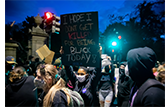Day 150, August 13, 2020
Special Purpose
Today's soundtrack: Larry Graham and Graham Central Station, Bataclan Paris, 2014
It is nearly the weekend. And for all the talk of a Groundhog Day existence in reference to that Bill Murray movie, I'm feeling incredibly grateful for the impending weekend, which is also the weekend before a vacation, a last deep gasp of air before diving into the semester. I still have appointments and meetings I'll have to make, but it is more like one a day instead of back to back Zoom meetings, reports, calls, etc. from 8 until 7 on some days.
 |
| Every day is a vacation for Junebug. |
I was talking with a friend and collaborator at GCC. She was talking about a great Zoom session she held with come colleagues and students. She mentioned how, for some of her colleagues, it was the kind of thing that is a rare occurrence and that she felt lucky that in our projects we get to experience that kind of excitement and exhilaration fairly frequently (my words, not hers).
It just so happened that I spent most of my late afternoon-evening writing about one of our projects where we engaged a group of student researchers in a participatory action research project. And like her information event, it was one of those truly moving experiences where everyone involved experienced a degree of transformation. A lot of this was captured in the transcripts of the interviews, and as I wrote up the work, I was constantly reminded of how lucky I am to be able to engage in such amazing work.
Working in education is such a privilege. We get to engage in work of the mind, we get to engage in the work of ideas. We get to collaborate with colleagues who have spent their lives thinking, reading about, studying, and teaching about important things. And we get to work with students who are a wide array of ages, who are parents, who are working at Dunkin' Donuts, who are working on farms, who are high school students, who are grandparents, who are eager to learn, who want to live in a better world, who are eager to learn how to engage in this world in a way that give their lives meaning. Working with students in a community college, helping give their lives meaning, helps absolve the haunting feeling that one's own life might be without meaning. It gives one a sense of purpose.
I suppose that is a kind of revelation, that we receive a sense of purpose from our work for, the things we do for other people. One of my kids was apologizing for asking for a favor, recently, and I told him, not to worry, it is one of my favorite things to help my kids. I enjoy getting a chance to do something for them.
I sometimes forget that, and think that a sense of purpose comes solely from my self, my desires, the things I want, the things I feel like I lack, or want to do. But it is actually really rare that I find sustenance entirely by myself. Instead, I find that what I thought I wanted or needed, is actually not as fulfilling as I imagined. It is from interactions with other people, the joy I get from seeing other people make discoveries, find agency, find meaning, that makes a difference for me. So that is all the more challenging in a pandemic where we are all socially distanced, wearing masks, making mental calculations about the risk of eating brunch on a sidewalk in Greenfield, or touching a shopping cart when there is no hand sanitizer left in the dispenser.
As we move closer to the start of the semester, I hope we are all able to remember the importance of the essence of our interactions. I've discovered that we can create meaningful experiences on Zoom. We can have productive meetings, generate exciting new ideas, and generate new friendships. But it is is harder. We need to be intentional about it. We have to be judicious with the degree of multi-tasking we let ourselves do. And we have to choose to engage. In this era, it is all too easy to withdraw, to disconnect, to become lost in our anxiety, fear, and sadness. And for sure, it is a time for anxiety, fear, and sadness. But as much as we can, we need to counter that with possibility, hope, and action. And love. At least, I hope that is what someone reminds me when I slip into a funk.
I'm not sure how much I'll blog from vacation, or if I'll take a break. In any case, I'll be thinking of you all.
Take care and stay safe,
Leo
From Our Friends:
From Higher Ed Jobs:
by Brian N. Williams, from The Conversation

In the wake of the death of George Floyd -- and the protests that it has sparked around the world -- public attention is focused on ending police brutality like never before. Higher education can make a difference and help empower students to take an active role in public safety, says a public policy scholar who examines the interplay between race, policing, and public governance. Here are several ways colleges and universities can get involved.
From the Cultural Research Network:
Today's Online Teaching Tips:
From OpenStax:
This year, OpenStax is working with three organizations to host the 2020 Open Education Conference as a virtual event from November 9-3. Designed through a community-driven process, the conference aims to engage diverse perspectives and inspire participants to strive for a future where education is accessible, affordable, equitable and inclusive for all. Sign up below to receive updates for the conference.
The supporting organizations include SPARC, the Colorado Department of Higher Education OER Council and the University System of Maryland’s Kirwan Center, and OpenStax.
Read more
Learn more





Comments
Post a Comment